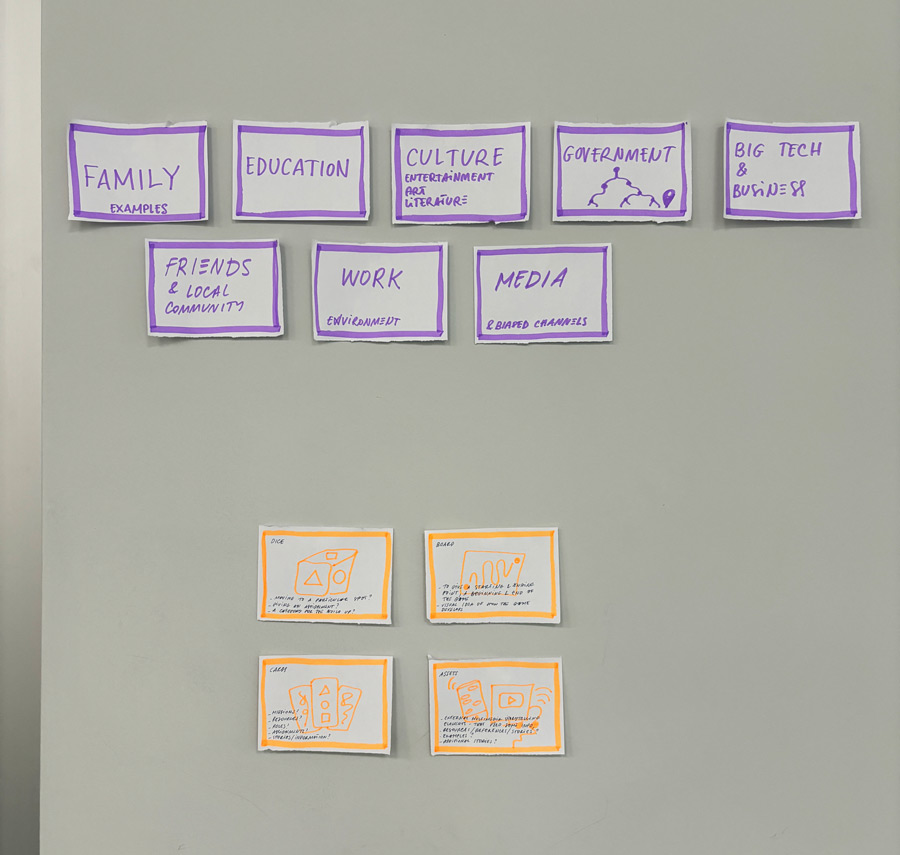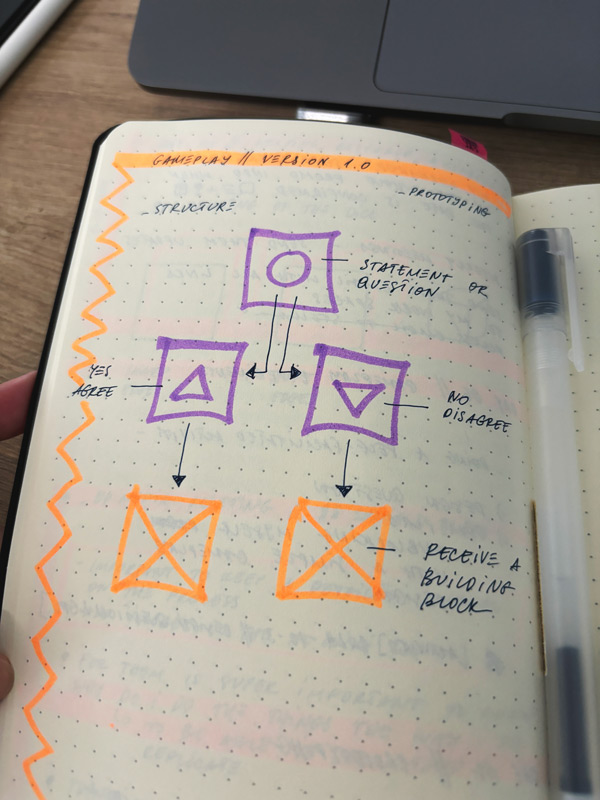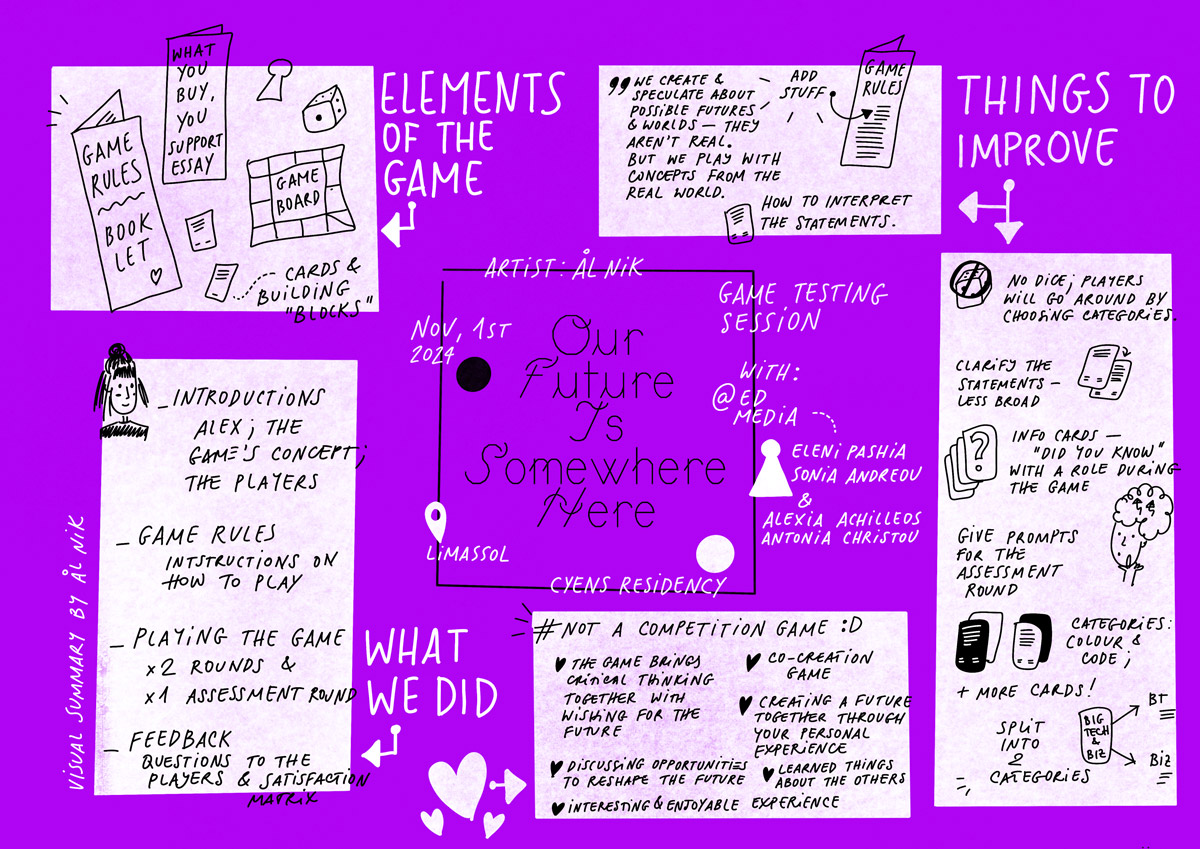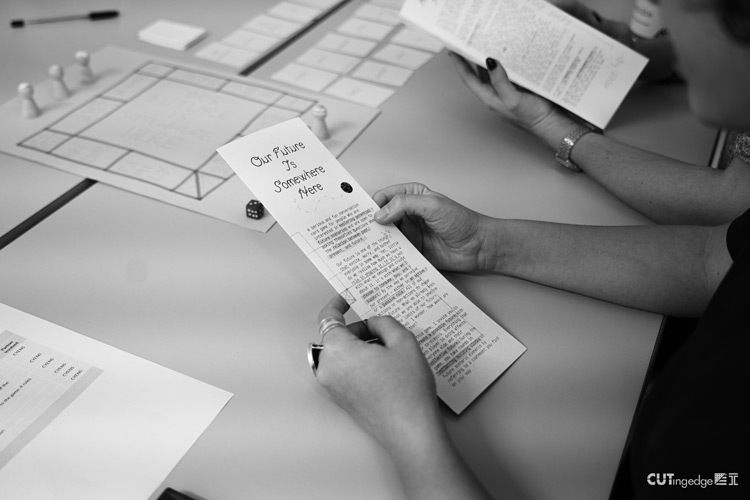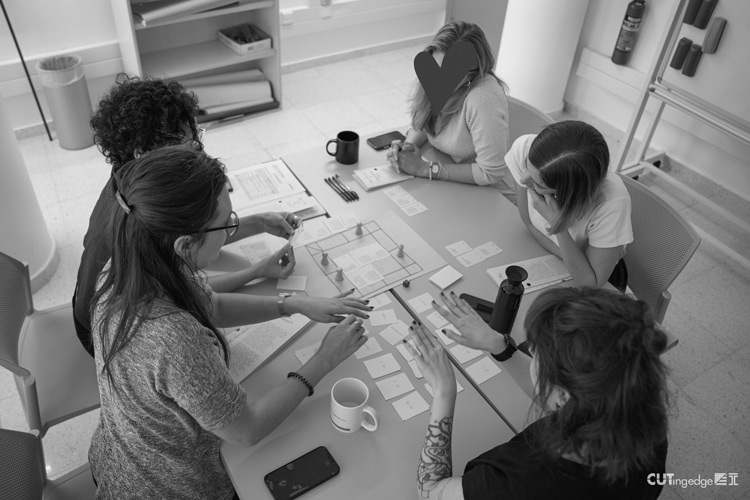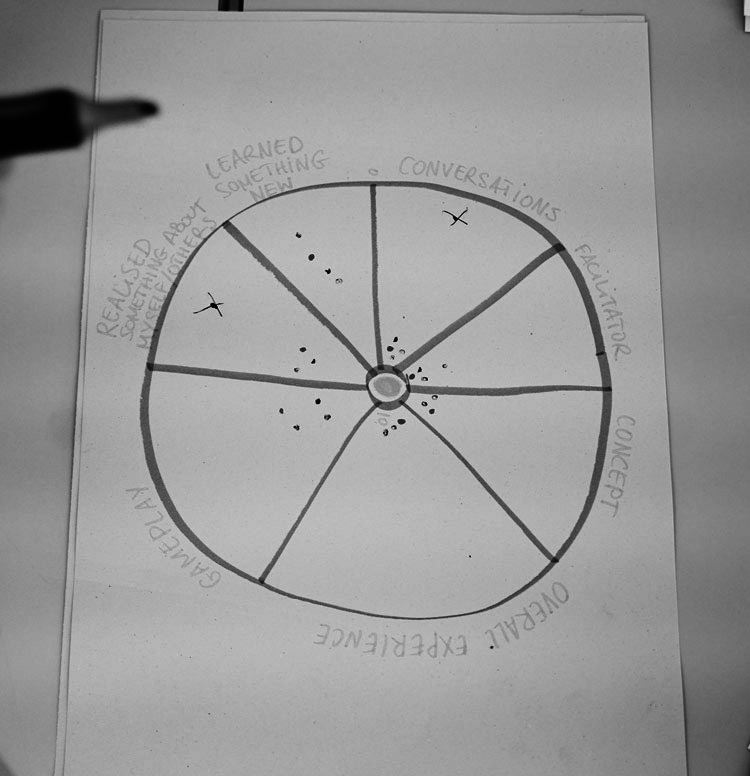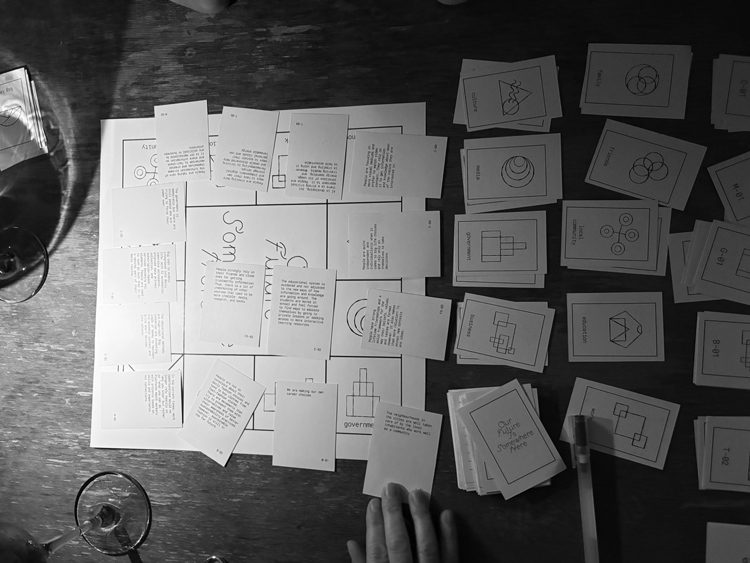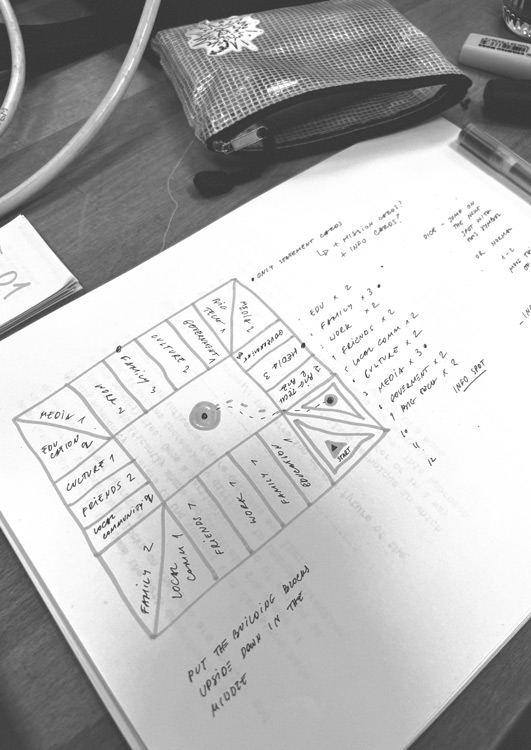CYENS Art Residency 2024
_work-in-progress
_intro
_residency
Between September and December 2024, I am taking part in CYENS Residency Programme as an artist-in-residence. For the first time this year, the programme is created in partnership with different research labs, thus six artists are coming to Lefkosia to do artistic projects researching various themes and practices. I was lucky enough to be selected to take part in the residency programme for 3 months and in collaboration with ▶▶ CYENS, ▶▶ Thinker Maker Space, and ▶▶ EdMedia.
_project
The essence of our future lies in our ability to envision what could be before it becomes reality. My project seeks to delve into the core principles of future speculations by acknowledging the vital entanglement between imagination and knowledge in shaping our tomorrow. This is a theme that I have been addressing several times in my work during the last two years, but with this residency, I would like to dedicate time and work on it to shape it as a space for conversation - a game - and speculate on the idea of a “future design” discipline.
_residency planning & log
_research (reading and writing) _conceptualising and ideation _prototyping _tests and feedback _adjustments and more prototyping _designing _writing editorial _communication materials _presentation (artist talk/workshop/exhibition) _documentation
| Weekssss | Overarching task | Description of Activities | TMS Equipment Used | What's the plan | Diary: what happened |
|---|---|---|---|---|---|
| WEEK 1 // 24-27 Sep | 1: conceptualising & first try-outs | Getting to know the people and the spaces + Begin research process | n/a | Getting settled at the space; and meeting in person the people who I will be working with. Settling up working space/locker and all practicalities. Starting to draft my plan (adjusting it also) for the residency, and prepare self-facilitation activities. Start of the research process. Setup the research and documentation spaces: notebooks, alwiki page. | 24, tue // first day at TMS, was welcomed by Stella and Sonia; got practical info about the residency, the space and equipment; agreed to do a workshop at the WIP festival; updating the work schedule for the residency and made this wiki page. 25, wed // finding a space to work; getting started - sorting out references, drafting plan and course of action; answering the "how to start?" question. Preparing self-facilitated daily routine for week 2. I've checked with Alex (technician) about 3D printing and he advised me to book an appointment when I have a particular element for printing (not just to explore how it works). 26, thu // Setting up the reader for the research ▶Future Design Reader; creating a self-facilitation structure and template for next week |
| WEEK 2 // 30 Sep - 4 Oct | 1: conceptualising & first try-outs | Research and conceptualisation + ▲ Online meeting | 3D printing | Research and ideation kick-off. During this week will work with the references and inspirations and start drafting intentions for the game and the whole project. | 30 sep, mon // "future design" stream of consciousness writing. Reading and work with references. Visual facilitation of elements. 01 oct, wed // self-interview about the game (writing activity). Meeting with EdMedia team. Drafting elements of the game. 02 oct, thu // Writing activity in the morning. Prototyping exercise. 3D printing tutorial for dice-making. |
| WEEK 3 // 7-11 Oct | 1: conceptualising & first try-outs | Concept ideation // ▲ Online meeting EdMedia // Researching | n/a (workshops busy for the festival) | Concept ideation week - drafting ideas of how the game could look like, different elements ideation & raw prototyping. Also, researching - exploring references, writing, reading. | 07 oct, mon // Prototyping. Getting 3D printed dice. 08 oct, tue // Reading & annotating. Prototyping. 09 oct, wed // Meeting with Eleni. 10 oct, thu // Research on causation models and reasoning for choice. |
| WEEK 4 // 14-18 Oct | 2: prototyping & testing | Prototyping + ▲ In-person meeting EdMedia | n/a (the whole space is occupied with the WIP festival) | Creating a rough prototype of some of the game elements. WIP Festival opening on Friday. | 15 Oct, tue // Prototyping - cards cut & mark, first draft, not a complete set. Gameplay visualisation. Ideas for a game board. Meeting with Eleni. 16 Oct, wed // Prototyping (statements and building blocks). First draft of the editorial (explaining what is this project about). Update alwiki pages. 17 Oct, thu // Work on the game board. Updating the statement and building cards, print & cut. Prep for next week's process + what to do to get ready for the workshops in Limassol (workshops checklist). |
| WEEK 5 // 21-25 Oct | 2: prototyping & testing | Prototyping + ▲ Online meeting EdMedia | none | Working on the prototyping and concept/storytelling of the game. Preparation for the game testing in Limasool the week after. | 22 Oct, tue // Preparation for the game session next week: workshop checklist and things to do. Session feedback prep. Creating first drafts of Info cards. 23 Oct, wed // Meeting with Stella (ThinkerMaker Space). Graphic design for the game elements for printing. 24 Oct, thu // Meeting with Eleni (EdMedia). Writing info cards' mini-essays - the first one on "What you buy, you support". |
| WEEK 6 // 28 Oct - 1 Nov | 2: game testing & feedback | Testing the prototype | n/a | Test with a small group of people in Limassol. | 28 Oct, mon // Printing, cutting, and folding of the designed materials for the workshop: booklets, cards, consent form. 29 Oct, tue // Design and preparation of the game board + the pawns. Resource writing. 30 Oct, wed // Last workshop prep & packing. 31 Oct, thu // Trip to Limassol. Meeting Eleni and Sonia at the Lab. 01 Nov, fri // Game testing workshop. Lunch with the participants. |
| WEEK 7 // 4-8 Nov | 2: feedback processing & prototyping | Adjusting the game design | Laser cut & engraving tutorial [7-11, 15:00 h] | Work on the project - conceptual adjustments after the workshop & feedback, designing, drawing, printing, and testing. | 04 Nov, mon // Processing the feedback from the session. Design for print of the game board. Iconography design. 06 Nov, wed // Statement cards edits, new cards & graphic design. All workshops and events schedule sum up + send to Stella for discussion. 07 Nov, thu // Statement cards edits, new info cards, graphic design and prepare for printing. |
| WEEK 8 // 11-15 Nov | 3: production start | Finalising the game | Laser cut & engraving with Stratis | Finalising the game & start working on the artwork for the exhibition. | 11 Nov, mon // Finishing designs & printing. 12 Nov, tue // Laser cut & engraving try out. Meeting with Stella. 13 Nov, wed // Game testing with the artists-in-residence. 14 Nov, thu // Exhibition artwork ideation. 15 Nov, thu // Теам meeting with Andri, Eleni, Sonia, Agnes. |
| WEEK 9 // 18-22 Nov | 3: production | Exhibition prep | n/a | Working for the exhibition. | 19 Nov, tue // Exhibition preparation plan. Writing and editing: introduction of the game, game rules, methods, categories. 21 Nov, thu // Writing and editing - code of conduct, editing the cards. Attending Betiana's workshop “Compostable Offerings” 🖤 22 Nov, fri // Booklets design. EdMedia meeting. Play with shapes for the pawns and 3D scan them. |
| WEEK 10 // 25-29 Nov | 3: production | Exhibition prep | n/a | Working for the exhibition. | 25 Nov, mon // Design of the game elements for printing. 26 Nov, tue // Design of the info cards and linking them to additional resources webspace. 27 Nov, wed // Artist series interview. 3D scanning of the pawns. Betiana exhibition opening and artist talk. |
| WEEK 11 // 2-6 Dec | 3: production | Exhibition prep | Game set printing & 3D pawns printing | Printing all the game elements. | 3 Dec, tue // Files for print final prep & visiting printing shop. 4 Dec, tue // Picking up prints, sorting out, check. Fixing mistakes & more printing. 5 Dec, thu // tba. |
| WEEK 12 // 9-13 Dec | 3: production & exhibition opening | tba | tba | tba | tba |
| WEEK 13 // 16-20 Dec | 4: wrapping up, reflection, documentation | tba | tba | tba | tba |
_process
During the residency, in order to help myself start and unblock when feeling stuck, I designed and/or applied some mini-exercises and routines.
_how to start
// To begin working is one of the hardest steps and I often feel like I start quite randomly, which makes me feel a bit unsatisfied of the process. With this residency, I wanted to "do it properly" or at least try out some ways to create some structure and tools from the beginning. Here are some of them:
_Daily routine for beginning 11:00 // writing [stream of consciousness or describing/answering questions I asked myself about the project] 12:00 // reading [work with references] 13:30 // lunch 14:00 // conceptualising, ideation, and prototyping [trying out, testing ideas, small-scale experiments] 16:00 // walk
_Self-interview One of my favourite and most efficient tools for unblocking myself - self-interview. Writing down questions for myself which I will answer later - all of them related to the particular stage of the working process. Here are some examples: _What would I like to try out during the residency? _What elements to include in the project and the project outcomes? Thinking of forms and formats. But also concepts, ideas, other things I find interesting/important. _What are my main blockers - what keeps me from experimenting more and what worries me?
_Contextualising The research’s start also includes a discovery and revisiting of references that will inform the project. In the beginning, I combine writing with reading and annotating. On a daily basis there should be time dedicated to reading/exploring references and annotations. _Create a references list. _Dedicate time for reading and annotating, write down notes, reflections and quotes. _Create a glossary. _What other references should be checked? Make a facilitated plan for doing it accordingly. (e.g. games - notes on how the game works, what’s its goal, what elements etc.) ★ As a result of this activity, there is now a ▶Future Design Reader.
_prototyping
// Getting from a big idea, a very meta and abstract concept to an actual project was a really challenging step. In order to be able to do something, I asked myself of what would be my design question for this project first. Once I had something to work with, then I started facilitating some steps for getting my hands on the gameplay.
_Design question // try to formulate a design question for the project _what would I like to do with the game?
to invite the players to have a meaningful conversation
make them more aware of the complexity of elements that influence their vision to the future
take a mission with them after the game - to do an action in the direction of shaping their own future
_working design question(s):
_how to bring the players through an experience of meaningful conversation and go through the complex process of forming an imagined future while raising their awareness of the elements that influence the way we see our present and future?
fears/worries:
_to make it feel forced or far-fetched or too straightforward or too complicated
_Gameplay prototyping // self-assignment 1/ Think of the simplest possible gameplay and describe it. _what is each player’s goal in the game? _how to obtain it? _what are the steps they need to take? 2/ Design it in a prototype.
_game testing
// I tested the game prototype at several game testing sessions:
// 0 // 28-10-2024 The first test was with two players who knew each other quite well. The game rules were explained, as well as the concept of the game and then we did one round of future building and one assessment round. It took around 30 minutes.
_feedback // The rules were clear. Liked the gameplay - with small, easy steps you can achieve your tasks. Liked the collaborative element of the game. The concept is innovative, interesting; It solves a problem - it helps you to understand that you need to change the present if you want to achieve a better future. Makes people think. Would like the game to be longer (make more cards). The players had an interesting conversation during and after the game - it triggered lots of thoughts to share, an instant connection to real-life situation in their life to be analysed, as well as self-reflection. Learned a new concept. Realised something about themself. They would play this game with close people (would feel challenged to play it with strangers); in the evening; on the beach.
// 1 // 01-11-2024 The second test was done at the EdMedia Lab in Limassol with four players. Some of them knew each other before, some - didn't. The profile of the participants was women, either PhD or PhD candidates. The play took around an hour. It was followed by a feedback session of 30 min.
_feedback // The gameplay, game concept, and overall experience was interesting and enjoyable for all of the players. Some elements brought some little confusion (the rolling of dice, how the statements to be interpreted, thus the game master had an important role). What the players liked the most: 🖤 how the game brings out critical thinking and puts together it with wishing for the future; the co-creation element; 🖤 to create a future together through their personal experiences; 🖤 the opportunity to discuss opportunities to reshape the future; and 🖤 the aesthetics of the design and visuals.
What to be improved after this session: + to get rid of the dice and create gameplay in which everyone can choose categories to explore // + clarify the statements, so it's easier to answer (make them less broad where possible) // + put some prompts for the assessment round, to be more of a conversation and collective decision-taking // + add some info in the introduction - about the way we play with real concepts in a speculated world; to have discussions after every choice and each player to share their reason of choice // + colours and codes for the design of the cards // + transform the info cards into short statements and questions for discussion (did you know cards) // + make more statement cards // + divide big tech & biz into two categories.
// 2 // 13-11-2024 Another session was done with the other resident artists at ThinkerMaker Space. The game was tested with 7 players (2 above the recommended number), so I invited them to make one round on the board with everyone trying two categories and one info card. The participants were artists and makers from Cyprus, Greece, Argentina, India, Germany, and Hungary. The game playing was about 1:30 h and the feedback round for about 15-20 min.
_feedback // 🖤 The gameplay, game concept, and overall experience were interesting and enjoyable for all of the players. The facilitation worked well, the players found the flow great. There was an ongoing dialogue during the game which they liked a lot. They discovered new information while playing the game and had interesting conversations between each other. One of the goals of the game is to raise awareness of what elements influence how the future is shaped: the players confirmed that the game makes them vocal. They also believe that it would eye-opening for people who don't work with the topic of future.
What to be improved after this session: + add longer introduction with why did I choose these categories; improve the "marketing" intro with adding the target group of the game and what is here for them; + make some bullet points in the game rules for better readability; + more scenarios and more speculative; + extension version with aliens etc.; + make more specific rules for the assessment round - how to be allowed to change the cards with more restrictions; + trivia section to give more context about the background and topics.
_project
The final goal of the residency is to create a game. For it, I have several goals in mind:
_to raise the players' attention towards the entanglement of our past, present, and future with the way we react to all the influences out there;
_to be a facilitated conversation opener for the players who will be able to discuss how ordinary things in their lives influence their futures, as well as their passive or active reactions to them;
_to give them an enjoyable experience.
You can discover how the project evolved and its final outcome here (it's a work in progress at least until December 2024):
▶ Our Future Is Somewhere Here
_reader
The references and inspirations that inform this research are connected to the worldwide topics of history, society, culture, technology, the contemporary world, current global and local challenges, and the future. With this exploration, I am interested in the friction between different reads, movies, games, and any artworks that give a take on how we imagine our future(s) and how much we realise our role in its(their) shaping. You can have a look at the reader and my annotations here:
_outcomes
The planned outcomes of the residency are:
_game // to create a game based on the topic of future design _workshops // game playing sessions during the working process; process and practice sharing interactive workshop at the end of the residency _artist talk // presenting the exhibited work _exhibition // to take part in a group show with the other residents
_references
_residency
★ CYENS - centre of excellence
★ Thinker Maker Space - a multifunctional creative space
★ EdMedia - applied research and innovation in the field of Interactive Media for Education and Edutainment
★ Cyprus University of Technology
_the rest of the artists-in-residence
★ Divleena Singh - artist, architect, and industrial designer
★ Betiana Pavón - trained and dabbled in various fields including Architecture, Interior Design, Photography, Styling and Art Direction
★ Dimitri Mertzos - work with analogue and digital sculpture, video, photography, artificial intelligence as well as data collection (material and conceptual)
★ Johannes Jakobi - an artistic researcher
★ Harry Varnavas - artist, architect & designer
★ Agnes Kaszas - actor, director, producer, art&tech designer, and entrepreneur
_local cultural events, spaces, and organisations discovered
★ Azines Library // zines and indie publications library
★ Visual Voices // art organisation supporting young artists from communities affected by a violent conflict
★ Phytorio // visual artists association
★ WIP Festival // an ever-evolving series of activities and exhibitions focused on arts & technology synergies
